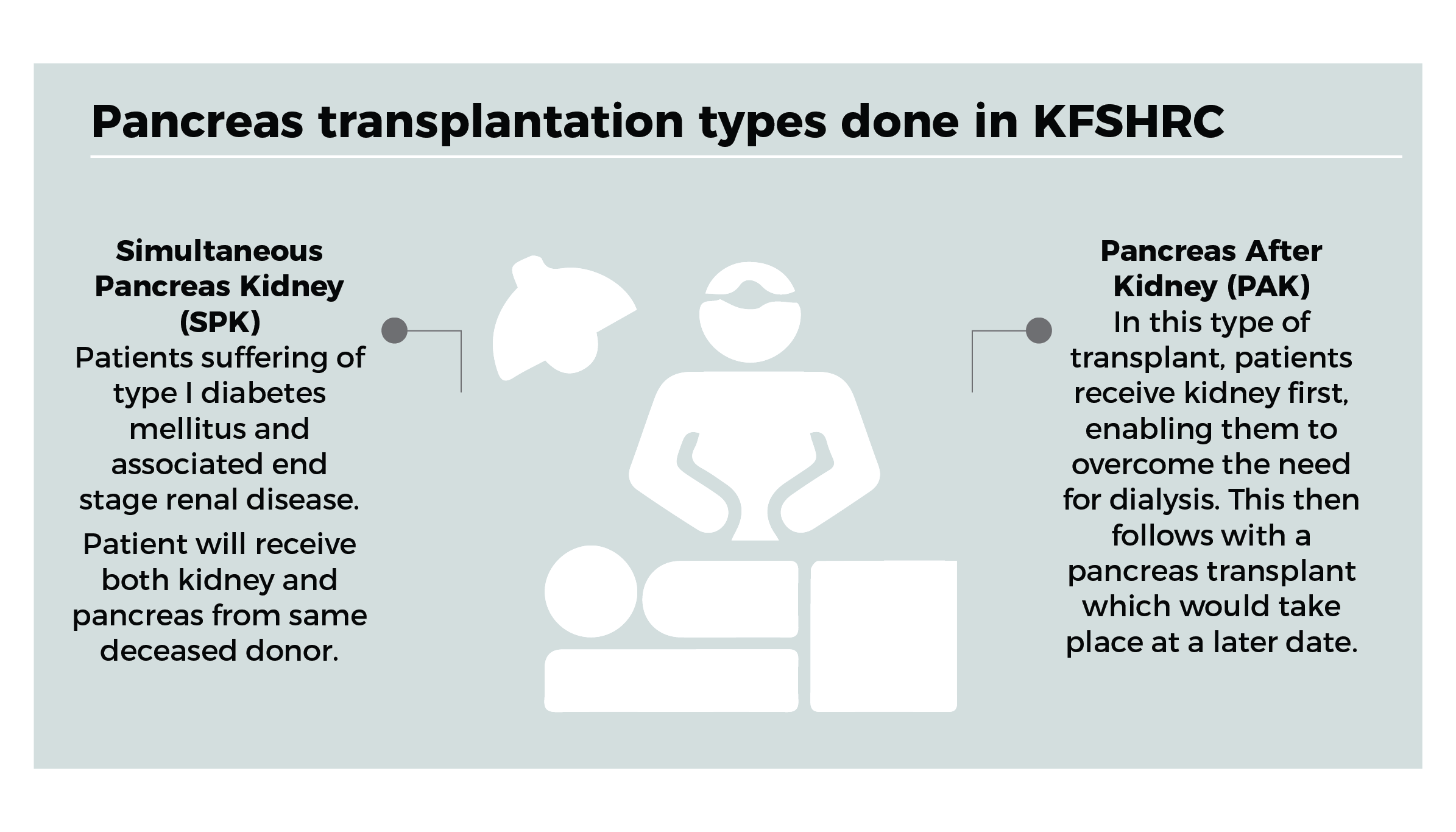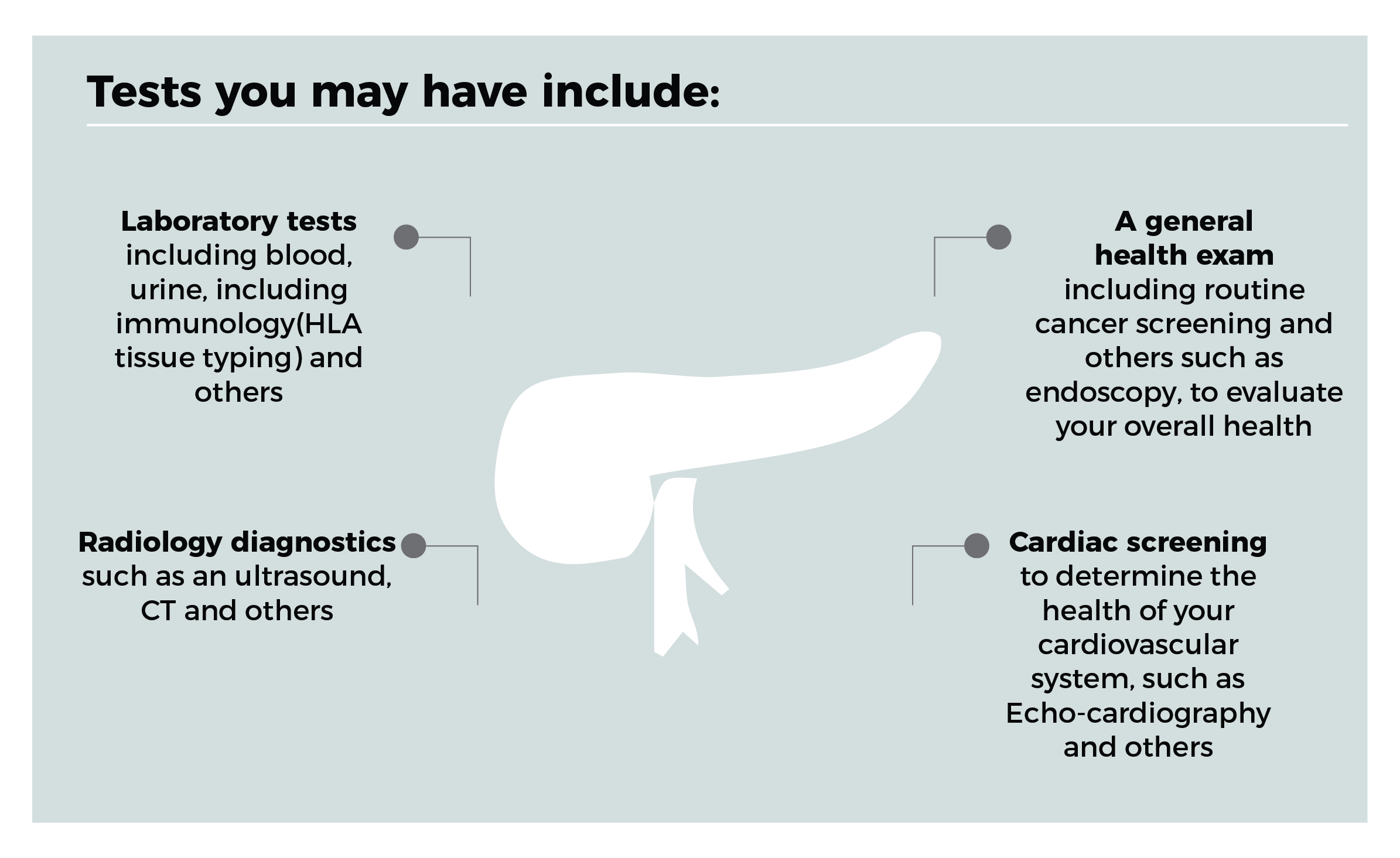Pancreas Transplant Program
Pancreas Transplant Program
Kidney and Pancreas transplantation is the best available treatment for type 1 diabetic patients who have end stage renal disease (ESRD) or advanced chronic kidney disease (CKD) likely to require renal replacement therapy in the near future. Kidney and pancreas transplantation is associated with better quality of life and has significant survival benefit comparing to patients with ESRD who will remain on or will enter dialysis.
Overview – What is a pancreas transplant?
A pancreas transplant is the transfer of a healthy pancreas from one person into the body of a person who has little or no pancreas function.
Who are the candidates for pancreas transplant?
Patients suffering of type I diabetes mellitus and associated end stage renal disease.
Pancreas transplantation types done in KFSHRC
1- Simultaneous Pancreas Kidney (SPK)
Patients suffering of type I diabetes mellitus and associated end stage renal disease.
Patient will receive both kidney and pancreas from same deceased donor.
2- Pancreas After Kidney (PAK)
In this type of transplant, patients receive kidney first, enabling them to overcome the need for dialysis. This then follows with a pancreas transplant which would take place at a later date.

Am I eligible for a pancreas transplant?
To determine if you are eligible for transplant, you must first have a transplant evaluation. This critical step helps decide whether transplantation is the correct course of action for your health. During the evaluation, you will meet with several members of the transplant team, including physicians, surgeons, and specialists from transplant team, social, nutrition, psychology, and many more. You will also meet your transplant coordinator, who will help guide you through the evaluation process. During your evaluation you will be required to complete additional testing. Once you have completed your evaluation, your health status and history will be presented to the transplant committee. Generally, most prospective patients are eligible for transplant; candidates who have no chance of surviving the surgical procedure are not eligible for transplant. The evaluation time takes approximately one to two months.
Depending on your overall health, you may need to stay in hospital while these tests are carried out, or you may only need to attend a series of outpatient appointments.
Tests you may have include:
- Laboratory tests, including blood, urine, including immunology(HLA tissue typing) and others
- Radiology diagnostics, such as an ultrasound, CT and others
- Cardiac screening to determine the health of your cardiovascular system, such as Echo-cardiography and others
- A general health exam, including routine cancer screening and others such as endoscopy, to evaluate your overall health

What to expect after workup:
- All types of Pancreas transplant is always done from a cadaver donor, so patient will be activated on the specified list after work-up completion.
- You will be called after that at any time for a potential cadaveric transplant.
- Work up will be done for the potential compatible recipients to choose the best candidate before organ recovery time.
After pancreas transplant:
- Patients will be seen in the outpatient clinic according to the following protocol.
- Twice weekly for 6 weeks (one visit in the nephrology clinic and the other in the transplant surgical clinic). Patients will not be discharged from the surgical clinic.
- Weekly for further 6 weeks
- Fortnightly for further 3 months
- Six months after transplantation, patients will be booked in the long-term follow up clinic
- In the long-term follow up clinic, patients will be seen every 4-6 weeks for further 6 months
- After completing 1-year follow up, patients will be seen every 3-4 months
- Protocol duodenal graft biopsies shall be arranged for postoperative days
0, 14, 30, 60, 90, 180, 365 (then yearly)